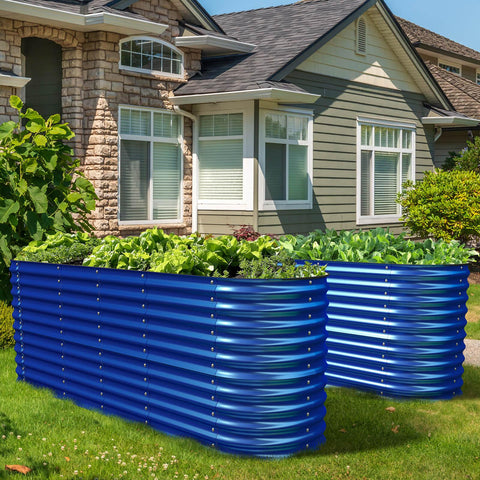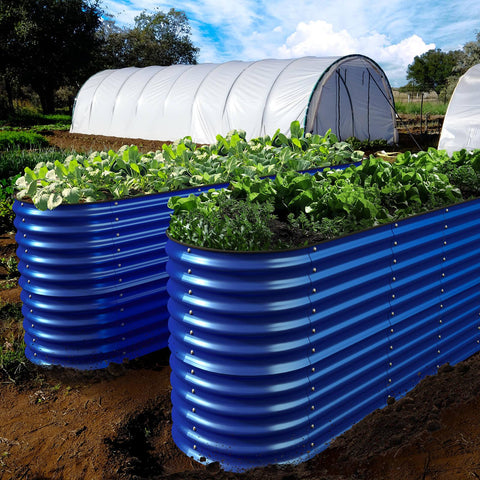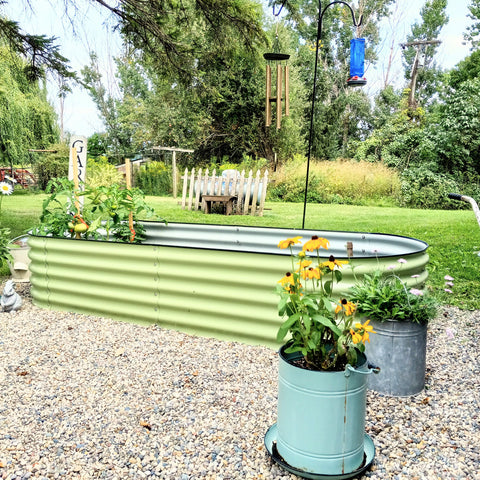Tips from Olle Garden Bed: Is Pepper Plant Perennial?
Pepper plant is the staple food of many annual vegetable gardens, but it is actually a perennial plant, which can be planted throughout the year in a warm climate without frost. They even grow thick wooden stems when they mature to the second year. Read more about these semi woody perennials and how to keep them alive after a growing season in the northern climate. The following content also has some reference value for raised garden beds.

Is pepper a perennial or an annual?
All pepper varieties are tender perennials, which means they can continue to grow without being exposed to frost.
Although pepper plants are usually grown as annuals, they can be grown as perennials in areas where there is no risk of frost. Alternatively, gardeners can winter pepper plants indoors and bring them back outdoors in the spring.
Over the years, some pepper plant varieties have grown much taller than normal growing seasons. For example, Dorset Naga and Ghost Pepper can grow to 5 feet or more in containers large enough to survive for several years, and can also grow underground.
How long can pepper plants live?
Pepper plants can easily survive for years if they are protected from frost and disease. With extra care, some gardeners have been able to keep their pepper plants alive for 5 to 15 years.
Because pepper plants are perennial plants, they can keep growing year after year. The absolute maximum life span of pepper plants is not clear, but some pepper plants are more likely to thrive for many years than others. However, if taken care of properly, kept away from frost, disease and pests, and pruned regularly, pepper plants can thrive and bear fruit for at least 5 years.
Does pepper plant resist frost?
Pepper plants are not frost resistant and die of hard frost, or even suffer from slight frost damage.
The low temperature above freezing point is also bad for pepper plants. Low temperatures can also cause flowers to fall, and exposure to temperatures below 50 ° F (10 ° C) for several days can cause chilli plants to be damaged by cicadas or hinder their growth.
One exception is pepper, which is a type of pepper that thrives naturally in the cool mountain climate of Bolivia and Peru. C. The pubescens varieties include Lokoto pepper and Manzano pepper. These varieties are known for their black seeds and hairy stems and leaves. They will still die from frost exposure, but can bear flowers and fruits at 50 ° F (10 ° C).

Tips: Overwintering pepper plants
Before the first frost, be sure to bring your pepper plants in.
Please trim the pepper plants before bringing them indoors. As long as you leave some branches with nodes, they will grow again. You can use this opportunity to check and remove pests.
After taking the pepper plants indoors, put them under indirect light or growth lamp when they recover. Usually you will find new growth starts within two weeks.
Indoor pepper plants need less water than outdoor pepper plants. After pruning, they will not absorb too much water until they fill the leaves again. Even if they grow again, the reduction of indoor heat means that the transpiration rate of leaves is slower and the evaporation in the soil is less.
Pepper plants can be placed indoors next to sunny south facing windows or under some growth lights.
The overwintering pepper plants need less fertilizer. If you just want them to stay active and healthy, they can be fed once or twice in winter.
Bring the pepper plants outdoors in spring: After the last frost date, and when the night temperature is above 50 ° F (10 ° C), bring the pepper plants outdoors. Trimming is not necessary, but some gardeners will trim around the last frost date to get new growth before bringing the pepper plants outdoors. You can read more about pruning peppers before and after winter here.
In spring, overwintering pepper plants can also benefit from hardening - gradually exposed to outdoor conditions, take them outdoors for several hours every day when the sun is not too strong, and slowly increase their time outdoors until they are permanently left in the outdoor season.
Can chilli plants get chilli when they overwinter?
Under sufficient light, such as full spectrum LED or fluorescent growth lamp, pepper plants grown in a fertile potting mixture can produce winter crops indoors. You may also need to pollinate the pepper manually.
It is common for people to grow pepper plants indoors for the first time that the plants grow healthy leaves, but there are few or no flowers or peppers. If you don't care about the winter harvest, you are just overwintering your pepper plants and keeping them alive until spring, which is not a problem. However, if you want to drink a pot of pepper in winter, the key is to have enough light and nutrition.
In general, more light leads to more flowers in pepper plants. Putting your pepper plants in a sunny south facing window in winter may be enough to keep them alive, but it usually does not support so much flower and fruit development, especially in high latitudes. In this case, you can add supplemental lighting or plant them entirely under LED or fluorescent plant growth lights
You also need to make sure that your pepper plants get enough nutrition. Winter pepper usually does not need too much fertilizer, but some additional fertilizer, such as tomato/vegetable fertilizer spike, can help support winter flowering and fruiting.
Finally, if you bloom but the flowers fall, it may indicate that your wintering pepper plants absorb too much nitrogen, overheat (this happens if you place the plants too close to the heat growth lamp), or they do not pollinate.

Peppers are self pollinated, but there are no pollinators indoors, and there is no wind to shake the flowers to release pollen. In this case, you can gently shake the pepper plant once a day or when it blooms, use a fan to provide a constant and gentle airflow for the plant, or manually pollinate and pat each open flower with a fine brush or cotton swab.
